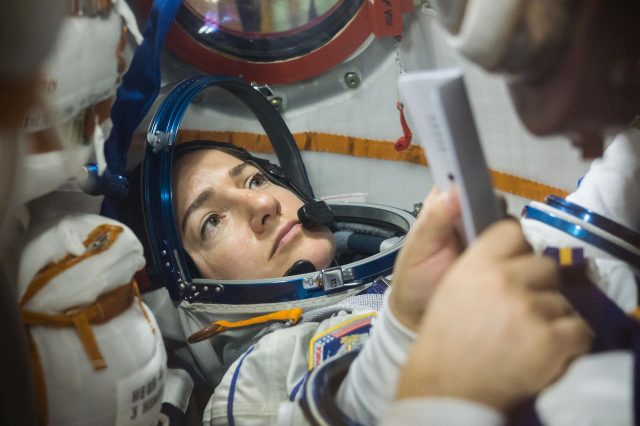
FLORIDA – A multinational crew, including NASA astronaut Jessica Meir and the first space traveler from the United Arab Emirates (UAE), is scheduled to launch to the International Space Station Wednesday, Sept. 25. NASA Television and the agency’s website will provide live coverage of the crew’s launch and arrival.
Meir, Oleg Skripochka of the Russian space agency Roscosmos, and Hazzaa Ali Almansoori from the UAE are set to launch at 9:57 a.m. EDT (6:57 p.m. Kazakhstan time) from the Baikonur Cosmodrome in Kazakhstan aboard the Soyuz MS-15 spacecraft.
The four-orbit, six-hour journey will be the third spaceflight for Skripochka and the first for Meir and Almansoori. Almansoori is flying on an eight-day mission as a spaceflight participant under a contract between the UAE and Roscosmos.
The new crew members will dock to the station’s Zvezda service module at 3:45 p.m.
About two hours after docking, hatches between the Soyuz and the station will open and the new residents will be greeted by station commander Alexey Ovchinin of Roscosmos, NASA astronauts Christina Koch, Nick Hague and Andrew Morgan, ESA (European Space Agency) astronaut Luca Parmitano, and Roscosmos cosmonaut Alexander Skvortsov.
Their arrival will increase the orbiting laboratory’s population to nine people until Oct. 3, when Hague and Ovchinin, who are completing a mission of more than 200 days, will return to Earth with Almansoori on the Soyuz MS-12 spacecraft. Meir and Skripochka will spend more than six months on the station.
Coverage of launch and docking activities is as follows (all times EDT):
- 9 a.m. – Soyuz MS-15 launch coverage
- 3 p.m. – Docking coverage
- 5 p.m. – Hatch opening and welcome coverage
The crew will continue work on hundreds of experiments in biology, biotechnology, physical science and Earth science aboard humanity’s only permanently occupied microgravity laboratory.
Check out the full NASA TV schedule, and video streaming information, at:
Meir, Oleg Skripochka of the Russian space agency Roscosmos, and Hazzaa Ali Almansoori from the UAE are set to launch at 9:57 a.m. EDT (6:57 p.m. Kazakhstan time) from the Baikonur Cosmodrome in Kazakhstan aboard the Soyuz MS-15 spacecraft.
The four-orbit, six-hour journey will be the third spaceflight for Skripochka and the first for Meir and Almansoori. Almansoori is flying on an eight-day mission as a spaceflight participant under a contract between the UAE and Roscosmos.
The new crew members will dock to the station’s Zvezda service module at 3:45 p.m.
About two hours after docking, hatches between the Soyuz and the station will open and the new residents will be greeted by station commander Alexey Ovchinin of Roscosmos, NASA astronauts Christina Koch, Nick Hague and Andrew Morgan, ESA (European Space Agency) astronaut Luca Parmitano, and Roscosmos cosmonaut Alexander Skvortsov.
Their arrival will increase the orbiting laboratory’s population to nine people until Oct. 3, when Hague and Ovchinin, who are completing a mission of more than 200 days, will return to Earth with Almansoori on the Soyuz MS-12 spacecraft. Meir and Skripochka will spend more than six months on the station.
Coverage of launch and docking activities is as follows (all times EDT):
9 a.m. – Soyuz MS-15 launch coverage
3 p.m. – Docking coverage
5 p.m. – Hatch opening and welcome coverage
The crew will continue work on hundreds of experiments in biology, biotechnology, physical science and Earth science aboard humanity’s only permanently occupied microgravity laboratory.
Check out the full NASA TV schedule, and video streaming information, at:









